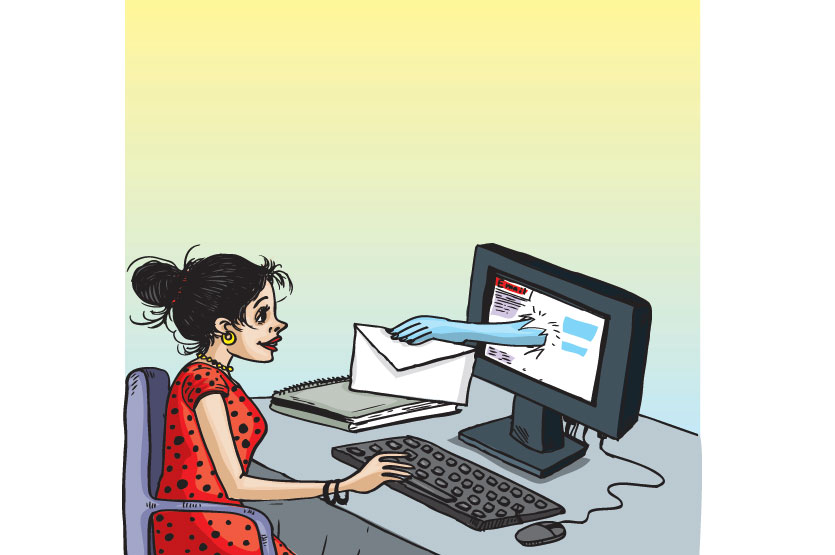Apr 07 2017.
views 318Communication in the work place underwent a serious and rapid transformation, when email was first introduced to say 'hi' and 'bye' to the loved ones. It generally evolved into the speedy communication tool that it is today, that gets quick attention and action, across the floor boards of the corporate. I remember reading an article, so long ago, where a leading social butterfly (then) described how her overseas-domiciled daughter wrote her this magical electronic mail, that came with the speed of light. At that time, I hadn't even seen a computer for real and felt so Flinston-ic!
That said, emails are the forms of letters we receive together with SPAM that clutters our inboxes. How many, however, of the email writers really understand and know how to write an email? Let's take a peek at some of the basic email etiquette that will grab attention and inspire the reader to act on what is being read.
For an example, let's say that the office needs to reduce half an hour from its lunch hour and build our thoughts around how this may be communicated to the rest of the community within the corporate walls.

1. Start with a salutation. If it is for all staff, "Dear Staff Members" or "Dear Colleagues" may look way better than a " Dear All".
2. Always fill the subject line in a manner that the reader understands that it needs to be read and acted on. Going by our example, the most appropriate subject line would be 'THE LUNCH HOUR : REDUCED TIME' or something that immediately conveys why the email is being written.
3. The main point should be in the opening sentence. Say for instance "Having carefully evaluated the increased influx of customer during the hours of 12 noon and 2pm, the management has decided to reduce the rostered lunch hour by 30 minutes". Most readers will not stay around to read an entire repertoire of why, wherefore and the how of it. It's a staff communication, so, let the most important aspect be in the first sentence.
4. Don't begin the email with a lame-duck wording. Ie It has come to the knowledge of the management, that…… etc which makes the email sound so boring, laborious and out of touch with the common man.
5. Avoid CAPITALS in the body of the email and EXCLAMATIONS. There is no need to shout at the reader and for the writer to appear at his wit's end. It conveys negative energy and conveys a hurried, harried, bossy and impolite undertone to the reader. Exclamations and question marks are to be used in the right place at the right time. If you need help, do get a copy of Fowler's Modern English Usage by Oxford press. An excellent presentation.
6. Be polite – always. That means, sarcasm and pettiness is also out. "Thank you for your understanding as to why the lunch hour was reduced", sounds tardy. Obviously, the management is conveying a tough decision which will affect the rest of the staff, not so well. Staff may not always understand why – so there's no need to rub salt on a sore spot.
7. Avoid slang and insults. I once read an email, written by quite a higher up that called a back office staff a 'donkey'! That is a career limiting statement, in the right corporate. Even in a tough or touchy situation, what is being written needs to be to the point, always polite and devoid of 'belittling'. If the email leaves the reader with a sense of being insulted, the writer has wasted his time, as action may not come forth in the required way and quality.
8. Avoid the Thumb (SMS) language and emojies. "BTW, the lunch has been reduced to ½ hr" in a corporate communication looks clumsy, to say the least. In the same vein "PLS, THNX, RGDS' should not be in a serious email. A smiley, smirking or grinning face will take away the seriousness of what the writer is trying to convey.
9. Write in a cordial ending and a closing salute. "The management has taken note that reduction to the lunch hour may inconvenience the staff to some extent, but is committed to evaluating the situation three months from now" may sound far better as a closure, than "As we are here to serve the customer, the management feels this is an appropriate step towards achieving its corporate goals", which leaves the staff, out in the cold with a feeling of being under the jack boots of an uncaring and cold management.
10. Confidential content should be restricted on emails, as falling into the wrong hands, the information can fly across space to all and sundry. If it needs to be put in an email, as corporates often do, please mark it clearly across the subject line as CONFIDENTIAL and input only those who need to know the information.
11. Pick the addressees carefully. I've known writers that copy a gamut of people in the office, just to cover their position, without care or thought to the fact whether all the fifty addressees on an email, really need to see it. As a principle, please don't clutter the inboxes of others, if they don't need to be included in the addressee list.
12. Add a name/designation block. If it always better that the email is written by the highest authority or the Human Resource division, in the case of our example and signed off by the Chief Executive Officer or the Head of Human Resources. This makes it more personal and appealing. In any case, a name/designation and contact information block sans the philosophical views of the writer cluttering the relevant information, is a 'necessary must' to a serious email.
0 Comments